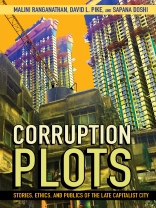Winner of the Anthony Leeds Prize in Urban Anthropology by the American Anthropological Association
Corruption Plots illuminates how corruption is fundamental to global storytelling about how states and elites abuse entrusted power in late capitalism. The millennial city of the global South is a charged setting for allegations of corruption, with skyscrapers, land grabs, and slum evictions invoking outrage at deepening economic polarization. Drawing on ethnography in Bengaluru and Mumbai and a cross-section of literary and cinematic stories from cities around the world, Malini Ranganathan, David L. Pike, and Sapana Doshi pay close attention to the racial, caste, class, and gender locations of the narrators, spaces, and publics imagined to be harmed by corruption.
Corruption Plots demonstrates how corruption talk is leveraged to make sense of unequal spatial change and used opportunistically by those who are themselves implicated in wrongdoing. Offering a wide-ranging analysis of urban worlds, the authors reveal the ethical, spatial, and political stakes of storytelling and how vital it is to examine the corruption plot in all its contradictions.
Über den Autor
Malini Ranganathan is Associate Professor in the School of International Service at American University and coeditor of the book Rethinking Difference in India through Racialization.David Pike is Professor of Literature and Film at American University. He is the author of Subterranean Cities; Metropolis on the Styx; and Cold War Space and Culture in the 1960s and 1980s.Sapana Doshi is Associate Professor of Critical Race and Ethnic Studies at the University of California, Merced. She has published on urban and environmental politics in journals such as Antipode; Annals of the American Association of Geographers; International Journal of Urban and Regional Research; and Geopolitics.












